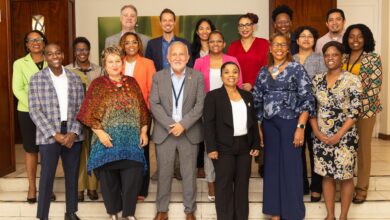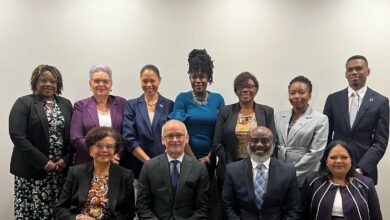Teachers and educators in early childhood education from across the Caribbean Community (CARICOM) are involved in a four-week training workshop to improve their capacity to deliver high quality distance learning experiences for young children.
The workshop commenced on Wednesday March 17, through a partnership among the United Nations Educational, Scientific and Cultural Organization (UNESCO), the CARICOM Secretariat and the Caribbean Child Development Centre (CCDC) of The University of the West Indies (UWI) Open Campus.
Concluding on April 7, the free online workshop explores topics including how to help parents to support their children during home-based learning, expectations for teachers and children, the appropriate timeframe for children’s attention span, and how to keep children engaged during online learning.
Speaking during the virtual launch event on Wednesday evening (March 17), Dr. Laurette Bristol, Programme Manager for the Human Development at the CARICOM Secretariat, underscored the importance of high quality early childhood education in individuals’ growth and development.

She acknowledged that the education sector’s response to the COVID-19 pandemic has placed greater emphasis on the upper levels of basic education, understandably so, because of the need for those students to transition to higher levels of learning.
With this training, she urged the participants to “buy-in to the responsibility to share” the knowledge they will obtain with their colleagues, and to exchange best practices among themselves to “build a strong foundation for quality early childhood education in the Region.”
Noting the severe challenges teachers and parents encounter with the technologically enabled learning environment, she said the CARICOM Secretariat is pleased to collaborate with UNESCO and the UWI Open Campus to offer the capacity building opportunity.
In her remarks, Dr. Faryal Khan, Programme Specialist for Education at UNESCO’s Cluster Office for the Caribbean, applauded the courage teachers have demonstrated in ensuring continuous leaning for young children, despite the challenges posed by the COVID-19 pandemic. Outlining the widely known impacts of the pandemic on education, she also acknowledged the tests teachers and parents face with applying technology to distance learning.

Dr. Khan said UNESCO has been supporting regional education stakeholders’ responses on the principle of Sustainable Development Goal 4, which seeks to ensure inclusive and equitable quality education for all. Part of those efforts included a series of webinars coordinated by UNESCO and the CARICOM Secretariat on COVID-19 Education Response in April 2020. That collaboration saw six webinar sessions discussing safe reopening of schools, gender inclusion, social and emotional skills, and technical and vocational skills and training.
The UNESCO Education Specialist said that Early Childhood Education and Care is a priority area, but attention to it has been inadequate. Fully aware of that fact, she said UNESCO recently organized high level and technical dialogues with advocates to prioritise the sector in the COVID-19 response, and to work towards a global strategy on Early Childhood Education and Care.
Encouraging the participants to immerse themselves in the training, she noted that the facilitators and the materials are “state of the art and high quality.”
Speaking at the opening, Head of the Caribbean Child Development Centre and Director of the Consortium for Social Development and Research of The University of the West Indies, Ms Ceceile Minott said the University is pleased to be associated with the “incredible partnership” with the CARICOM Secretariat and UNESCO.

She said the registration for the workshop was overwhelming and expressed regret that the coordinators had to limit the number to 40 practitioners. In this vein, she stressed the need for the participants to share the knowledge they will gain during the course of the workshop.
Ms Minott noted that the activity is not a seminar, but a workshop that will be “very participatory.”
She assured the participants that they were “in very capable hands” with facilitators who were Early Childhood Development coordinators and teachers. Ms Minott added that the UWI-Open Campus has developed expertise in distance learning methodologies, which it is pleased to share.






